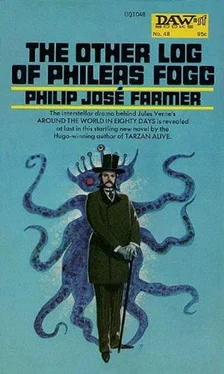Philip Farmer - The Other Log of Phileas Fogg
Здесь есть возможность читать онлайн «Philip Farmer - The Other Log of Phileas Fogg» весь текст электронной книги совершенно бесплатно (целиком полную версию без сокращений). В некоторых случаях можно слушать аудио, скачать через торрент в формате fb2 и присутствует краткое содержание. Жанр: Фантастика и фэнтези, на английском языке. Описание произведения, (предисловие) а так же отзывы посетителей доступны на портале библиотеки ЛибКат.
- Название:The Other Log of Phileas Fogg
- Автор:
- Жанр:
- Год:неизвестен
- ISBN:нет данных
- Рейтинг книги:3 / 5. Голосов: 1
-
Избранное:Добавить в избранное
- Отзывы:
-
Ваша оценка:
- 60
- 1
- 2
- 3
- 4
- 5
The Other Log of Phileas Fogg: краткое содержание, описание и аннотация
Предлагаем к чтению аннотацию, описание, краткое содержание или предисловие (зависит от того, что написал сам автор книги «The Other Log of Phileas Fogg»). Если вы не нашли необходимую информацию о книге — напишите в комментариях, мы постараемся отыскать её.
The Other Log of Phileas Fogg — читать онлайн бесплатно полную книгу (весь текст) целиком
Ниже представлен текст книги, разбитый по страницам. Система сохранения места последней прочитанной страницы, позволяет с удобством читать онлайн бесплатно книгу «The Other Log of Phileas Fogg», без необходимости каждый раз заново искать на чём Вы остановились. Поставьте закладку, и сможете в любой момент перейти на страницу, на которой закончили чтение.
Интервал:
Закладка:
“But a wind did arise, filling the square sails, and the ship moved away from the shoals. It was however, going westward in a direction opposite to its original course. The towline became taut and was pulled at an angle away from the ship. It broke. The yawl, though rowed desperately toward the ship, could not catch up.”
“And why didn’t Head bring the ship about?” Fogg said.
“Because he was afraid that he could not depend on Brigg’s gratitude. Briggs was a stern New England skipper who would probably arrest him and charge him with mutiny even if Head had saved the whole company.”
Was Nemo telling the whole truth? Had the sudden strain really snapped the towline? Or had Head severed it to make sure that Briggs would not get back aboard? By the time the yawl made land or its passengers were picked up by another ship-if they did not perish before this at sea-Head would be long gone.
As for the story of the panicky and premature abandonment; that could be true enough. About two hundred and thirty-two derelicts were found every year. Sometimes, the crews were picked up by other ships. Sometimes, they were never seen again. Sometimes, the reasons for the hasty desertions were unknown. A fire, an explosion, too much water in the hold. Sometimes, no reasons could be found by the investigators.
The case of the Mary Celeste was only one of many-if it were ever found. Many ships were just swallowed up by the ocean.
“The ship went through several squalls, hence the damage to the sails and the wetness of the floors and garments in some of the cabins,” Nemo said. “There was little that Head could do about them, and they were not serious. He was mainly concerned with making contact with our people who had distorters. He did not even bother shutting the doors or the fore and lazaret hatches though he did wash the dishes.
“He was beginning to despair, because if a violent storm did hit the ship, it would surely go down with him aboard.”
“He will despair no more,” Fogg said.
15
Fogg told Nemo to wait a few minutes before the truce arrangements were put into effect. This delay would upset Nemo, who would wonder what Fogg was up to. Fogg did not worry about this. He only wanted time for another inspection of the corpse.
Being a very tidy man, he cleaned up the blood on the floor with a piece of canvas. Later, he would use sea water to remove all traces of blood from the floor and water and lemon juice to cleanse the sword. The latter he would put back in its scabbard under the captain’s bed. Fogg wished to leave the ship much as he had found it.
He stripped the body, felt the clothes, and then ripped them open with his jackknife. He found nothing in them. The boots were taken apart, but these revealed nothing. Head seemed to have all his original teeth; there were no caps concealing hollows in which objects could be kept. With some repugnance, he probed the anal cavity but found it to be only as nature intended it.
Possibly, the skin bore schematics or writing in some type of invisible ink. He had no means to bring these out. Should he drop the body into the sea or take it back to the General Grant for more tests? There was bound to be a hullabaloo because of the three series of clangings, and when these sounded for the fourth time, announcing his arrival, more uproar would ensue. Every cabin might be searched, and it would be more than embarrassing to try to explain Head’s corpse.
Before finishing his examination, he pulled on the corpse’s hair again to make sure that a shaved head with a code on it was not below a wig. Head’s hair seemed to be his own.
Fogg arose and went to the doorway. He declared that he was ready to start disarmament proceedings. Passepartout thoroughly frisked Nemo while Nemo held his revolver at Passepartout’s head. The Frenchman announced that Nemo seemed not to have concealed any weapons since the inspection on the General Grant.
Nemo frisked Passepartout with the same results.
Passepartout then moved away, stopping when he came to the railing.
Nemo grasped the barrel of his Colt in his right hand, which retained enough strength for this task. He prepared to eject the cartridges from the magazine. Fogg threw the sword and jackknife and Head’s knife outside. He stood in the doorway, holding his revolver by the barrel. Together, as Passepartout slowly counted, the two got rid of their cartridges.
Fogg stepped outside onto the deck, his cartridges in one hand. Nemo backed away until he was by the starboard railing. Fogg backed away to the port railing. At a signal from Passepartout, both men, one by one, in unison, tossed their cartridges into the sea. Fogg had removed his coat and shirt before coming out of the deckhouse to ensure that he would not be able to palm any cartridges. This was unnecessary, since the cartridges could be seen sailing away over and into the sea.
Passepartout threw the knives into the ocean. Nemo had permitted the Frenchman to do this because he did not think he was in a condition to hurt him even if Passepartout did come at him with a knife.
Nemo had wanted the sword to go overboard, too, but Fogg had insisted that all articles aboard were to be restored to their original positions, except for Head, of course.
This was a ticklish moment. Nemo could make a dash for the sword. If Passepartout picked it up first, Nemo thought he could dodge the first feeble slash and close in with Passepartout. Even if Passepartout threw it overboard, Nemo would have the others at a disadvantage. Wounded though he was, and still suffering a strong headache from the two blows on his head, he felt that he was physically superior to the combination of the others.
It was then that Fogg reminded him that Aouda was waiting at the other end with the cyanide expeller. She had orders to use it if Nemo appeared alone.
Despite all this, Nemo suddenly decided that he would attempt to overpower them. If he could get Fogg over the railing and into the sea, he could deal easily enough with the Frenchman. He would not kill him, because he might need him to transmit the proper code to Aouda. But there were many ways to make him yield that information. And if Passepartout should somehow refuse, or die, then he would send a message to the man from China. The fellow surely must be listening by now. Or, if that failed, he would turn the ship around toward the east again and hope that another ship would sight the Mary Celeste.
It was at this moment that Nemo was stricken with a fit of shaking. Whether it was the first time or not, we do not know. Fogg was startled, because he had not observed anything like this while serving under Nemo. From later accounts by another Briton, the fits became more numerous and one phase of them became permanent. What the nature of the disease was, no one knows. Perhaps his neural charges, restrained too long, damped a part of his brain.
In any event, on this occasion Nemo began shaking violently all over. This lasted for about a minute, after which he seemed to regain a partial control. Now only his head, with the face thrust forward, oscillated in a curiously snake-like fashion. This, with his high domed forehead and the large widely spaced eyes, made him look like a king cobra.
After perhaps sixty seconds, the nervous motion ceased. He had become even paler, and he looked very weary. He passed his hands over his eyes and groaned loudly enough for Passepartout to hear him.
“Great God! Enough! Enough!”
Then he said, “I can’t do it!”
Neither of the Eridaneans knew what he meant by this, but we may deduce that he had planned a final attack on them but now realized that he could not carry it out.
Passepartout took the sword to the captain’s cabin, cleaned it as required by Fogg, and put it back in its scabbard under the bed. When he returned, he found that neither Fogg nor Nemo had moved.
Читать дальшеИнтервал:
Закладка:
Похожие книги на «The Other Log of Phileas Fogg»
Представляем Вашему вниманию похожие книги на «The Other Log of Phileas Fogg» списком для выбора. Мы отобрали схожую по названию и смыслу литературу в надежде предоставить читателям больше вариантов отыскать новые, интересные, ещё непрочитанные произведения.
Обсуждение, отзывы о книге «The Other Log of Phileas Fogg» и просто собственные мнения читателей. Оставьте ваши комментарии, напишите, что Вы думаете о произведении, его смысле или главных героях. Укажите что конкретно понравилось, а что нет, и почему Вы так считаете.












